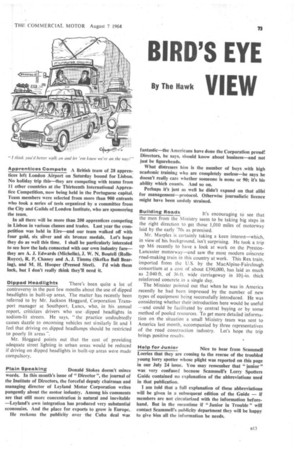BIRD'S EYE
Page 75

If you've noticed an error in this article please click here to report it so we can fix it.
By The Hawk VIEW
Apprentices Compete A British team of 28 apprentices left London Airport on Saturday bound for Lisbon. No holiday trip this—they are competing with teams from 11 other countries at the Thirteenth International Apprentice Competition, now being held in the Portuguese capital. Team members were selected from more than 900 entrants who took a series of tests organized by a committee from the City and Guilds of London Institute, who are sponsoring the team.
In all there will be more than 200 apprentices competing in Lisbon in various classes and trades. Last year the competition was held in Eire—and our team walked off with four gold, six silver and six bronze medals. Let's hope they do as well this time. I shall be particularly interested to see how the lads connected with our own industry fare— they are A. J. Edwards (Michelin), J. W. N. Boutell (RollsRoyce), R. P. Chaney and A. J. Timms (Skefko Ball Bearing), and M. H. Hooper (Pressed Steel). I'd wish them luck, but I don't really think they'll need it.
Dipped Headlights There's been quite a lot of controversy in the past few months about the use of dipped headlights in built-up areas. The matter has recently been referred to by Mr. Jackson Hoggard, Corporation Transport manager at Southport. Lanes, who, in his annual report, criticizes drivers who use dipped headlights in sodium-lit streets. He says. "the practice undoubtedly causes dazzle to oncoming vehicles not similarly lit and I feel that driving on dipped headlamps should be restricted to poorly lit areas ".
Mr. Hoggard points out that the cost of providing adequate street lighting in urban areas would be reduced if driving on dipped headlights in built-up areas were made compulsory.
Plain Speaking Donald Stokes doesn't mince
words. In this month's issue of "Director ", the journal of the Institute of Directors, the forceful deputy chairman and managing director of Leyland Motor Corporation writes pungently about the motor industry. Among his comments are that still more concentration is natural and inevitable —Leyland's own integration has produced very substantial economies. And the place for exports to grow is Europe.
He reckons the publicity over the Cuba deal was fantastic—the Americans have done the Corporation proud! Directors, he says, should know about business—and not just be figureheads.
What distresses him is the number of boys with high academic training who are completely useless—he says he doesn't really care whether someone is none or 90; it's his ability which counts. And so on.
Perhaps it's just as well he didn't expand on that alibi for management—protocol. Otherwise journalistic licence might have been unduly strained.
Building Roads It's encouraging to see that
the men from the Ministry seem to be taking big steps in the right direction to get those 1,010 miles of motorway laid by the early '70s as promised.
Mr. Marples is certainly taking a keen interest—which, in view of his background, isn't surprising. He took a trip up M6 recently to have a look at work on the PrestonLancaster motorway—and saw the most modern cOncrete road-making train in this country at work. This Rex train, imported from the U.S. by the MacAlpine-Fairclough consortium at a cost of about £390,000, has laid as much as 1040 ft. of 36 ft, wide carriageway in 104-in, thick reinforced concrete in a single day.
The Minister pointed out that when he was in America recently he had been impressed by the number of new types of equipment being successfully introduced. He was considering whether their introduction here would be useful —and could be facilitated by central buying or by some method of pooled resources. To get more detailed information on the situation a small Ministry team was sent to America last month, accompanied by three representatives of the road construction industry. Let's hope the trip brings positive results, Help for Junior
Nice to hear from Scammell Lorries that they are coming to the rescue of the troubled young lorry spotter whose plight was reported on this page in our July 24 issue. You may remember that "junior " was very confused because Scammell's Lorry Spotters Guide contained no explanation of the abbreviations used in that publication.
I am told that a full explanation of these abbreviations will be given in a subsequent edition of the Guide — if members are not circularized with the information beforehand. But in the meantime if "Junior in Trouble" will contact Scammell's publicity department they will be happy to give him all the information he needs.
Help for Junior
























































































































